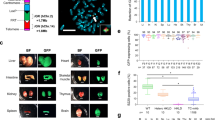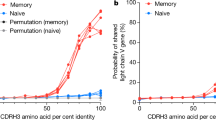Abstract
An immunoglobulin (Ig)-producing lymphocyte can sometimes express one heavy-chain variable (VH) region combined with different heavy-chain constant (CH) regions. For example, single cells making IgM and IgD with the same antibody specificity have been observed1. Cells, both singly2 and in mass culture3,4, switch from IgM to IgG production, and it is believed that the variable regions expressed are the same before and after the switch. We describe here the analysis of a hybrid derived by fusing an IgM-producing cell with an IgG producer, where the corresponding μ, and γ heavy chains bear different variable regions, denoted V1 and V2. This hybrid makes only the parental heavy chains—V1Cμ and V2Cγ—and not the novel combination V2Cμ. This result suggests that the μ and γ heavy-chain classes are not determined by classspecific RNA processing.
This is a preview of subscription content, access via your institution
Access options
Subscribe to this journal
Receive 51 print issues and online access
$199.00 per year
only $3.90 per issue
Buy this article
- Purchase on Springer Link
- Instant access to full article PDF
Prices may be subject to local taxes which are calculated during checkout
Similar content being viewed by others
References
Goding, J. & Layton, J. J. exp. Med. 144, 852–857 (1976).
Wabl, M., Forni, L. & Loor, F. Science 199, 1078–1079 (1978).
Kearney, J. & Lawton, A. J. Immun. 115, 671–676 (1975).
Pernis, B., Forni, L. & Luzzati, A. Cold Spring Harb. Symp. quant. Biol. 41, 175–183 (1976).
Gilbert, W. Nature 271, 501 (1978).
Tonegawa, S., Maxam, A., Tizard, R., Bernard, O. & Gilbert, W. Proc. natn. Acad. Sci. U.S.A. 75, 1485–1489 (1978).
Köhler, G. & Milstein, C. Eur. J. Immun. 6, 511–519 (1976).
Köhler, G., Pearson, T. & Milstein, C. Somat. cell. Genet. 3, 303–319 (1977).
Milstein, C. et al. Cold Spring. Harb. Symp. quant. Biol. 41, 793–803 (1976).
Köhler, G. & Milstein, C. Nature 256, 495–497 (1975).
Raschke, W. in Current Topics in Microbiology and Immunology 81, 70–76 (eds F. Melchers et al.) (Springer-Verlag, 1978).
Cotton, R. G. H., Secher, D. S. & Milstein, C. Eur. J. Immun. 3, 135–140 (1973).
Kronvall, G., Grey, H. & Williams, R. J. Immun. 105, 1116–1123 (1970).
Nordin, A. A., Cosenza, H. & Hopkins, W. J. Immun. 103, 859–864 (1969).
Gronowitz, E., Coutinho, A. & Melchers, F. Eur. J. Immun. 6, 588–590 (1976).
Potter, M. Physiol. Rev. 52, 631–719 (1972).
Author information
Authors and Affiliations
Rights and permissions
About this article
Cite this article
SHULMAN, M., KÖHLER, G. Immunoglobulin µ and γ heavy chain classes are not determined by class-specific RNA-splicing enzymes. Nature 274, 917–919 (1978). https://doi.org/10.1038/274917a0
Received:
Accepted:
Issue Date:
DOI: https://doi.org/10.1038/274917a0
This article is cited by
-
An immunoglobulin heavy-chain gene is formed by at least two recombinational events
Nature (1980)
-
Different species of messenger RNA encode receptor and secretory IgM μ chains differing at their carboxy termini
Nature (1980)
-
A better cell line for making hybridomas secreting specific antibodies
Nature (1978)
Comments
By submitting a comment you agree to abide by our Terms and Community Guidelines. If you find something abusive or that does not comply with our terms or guidelines please flag it as inappropriate.



